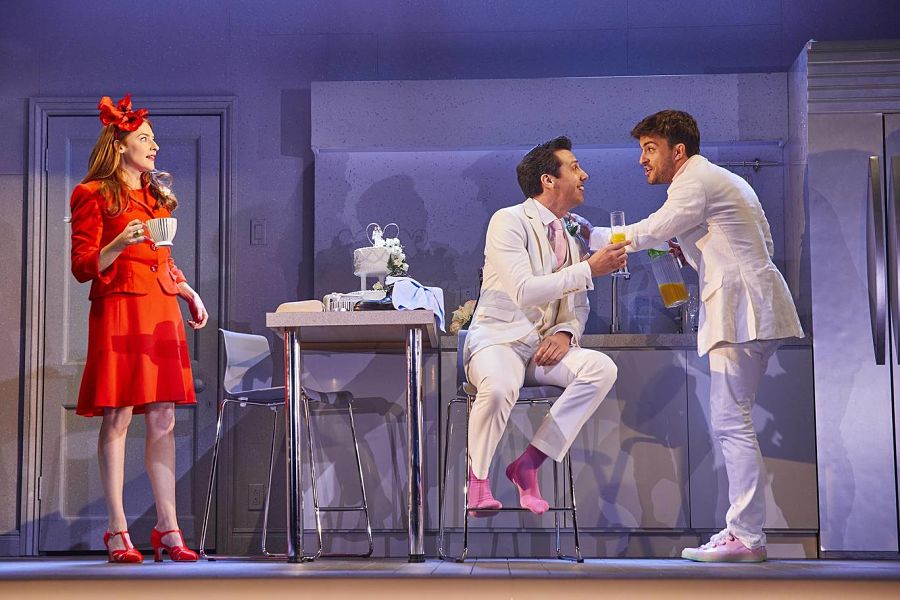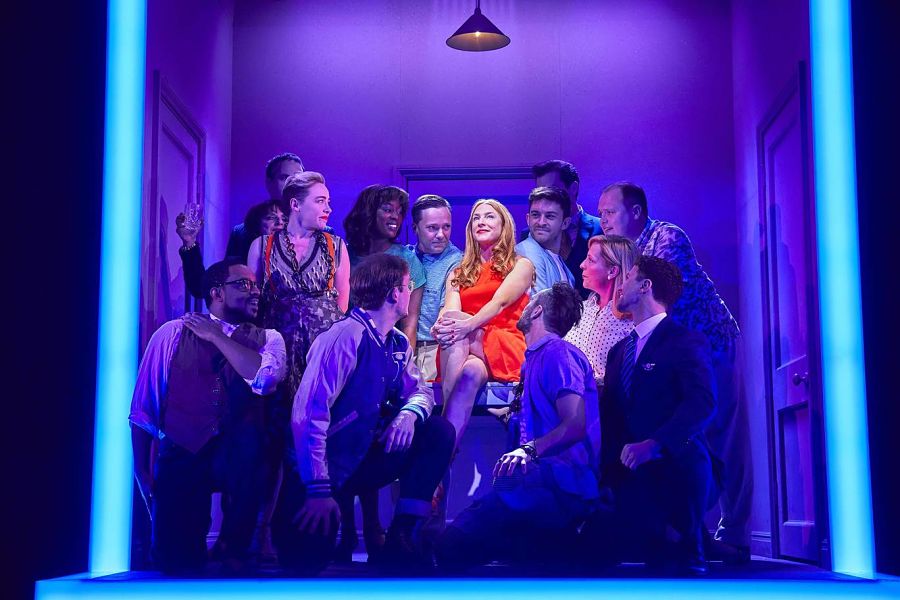Company has been rewritten and yet scarcely a word has been touched. Marianne Elliott’s gender-flipped production of Stephen Sondheim and George Furth’s reflection on love and life actually changes shockingly little of the original text. But in the singular act of changing the gender of the leading role, the production becomes instantly contemporary in what it expresses. There is always an audience for a sepia-tinged, museum-piece revival. But Elliott is not the director to deliver that.
Instead Elliott has delivered the only version of Company conceivable for 2018. Not least our political backdrop makes the eternal bachelor narrative of the original troubling to contemplate. But the very possibility of Company feeling outdated is erased by the gender flip. While the imperative to marry may not loom as large at present as it did in 1970, when the form-breaking show premiered, the impact of settling down—when, how, and who with—will always loom large in a woman’s life, for the simple reason that a woman’s life changes when she makes that decision in a way a man’s still does not. All the questions Company poses—What do you want to get married for? How many times do you get to be 35?—still feel like especially burning issues for women. And Elliott’s production, playing on the West End until March 2019, balances these in a deft reworking of the original material.
Elliott’s direction is stylized and surrealist, and strikingly timeless. Neon boxes form New York apartments; Bunnie Christie’s interlocking and automated design feels almost futuristic rather than strictly contemporary. This is Company for both now and going forward, rather than looking back. Christie’s boxes fulfill another function: As they glide across the stage and click into place, interconnecting and interlocking, the feeling is of relationships boxed in claustrophobically, alongside the interconnectedness of the characters’ lives. Bobbie (Rosalie Craig) moves from one box to another, through doors as if tumbling through worlds.
But also trapped in them. With everyone crowded into the box of Bobbie’s apartment, it’s filled to the brim. In “Another Hundred People,” an ensemble come from nowhere for the first time, filling the boxes—now signifying subway cars—to the brim. It is city living but also modern life: overwhelmingly crowded, endlessly noisy. At times Bobbie longs to escape, which she does, through door after door, room to room, often finding nothing, not finding what she’s looking for. It’s Alice in Wonderland with Scotch in hand.
Craig is an assured Bobbie, with a dark edge of vulnerability and something else—a steely grey strength and grief all at once. She is quirky and fun in the early scenes. Her interactions with the revolving door of friends conjures a real “life of the party” sense in which Bobbie is all things to everyone, with all the demands that entails. The friends themselves, despite some gender switches of their own, remain true to the original, while still giving a modern take on coupled life. From the comedic Sarah and Harry, hiding their drink and brownie intake (an additional fun in-joke from Mel Giedroyc, formerly of “The Great British Bake Off”), to the unconventional Susan (Daisy Maywood) and Peter (Ashley Campbell), the friends serve as reflections of what could be for Bobbie. Most tellingly, the places in which the switch has strongest implications are with Joanne (Patti LuPone) and Larry (Ben Lewis), and Paul (Alex Gaumond) and Jamie (Jonathan Bailey), formerly Amy.
The gender flip of Jamie to Amy, with Jamie and Paul being a gay couple about to marry, and Jamie singing “Not Getting Married” (a show stopper from Jonathan Bailey), brings home a succinct point on contemporary gay life: the struggle to reconcile marriage and freedom. Amid his frenetic delivery, Bailey brings out the conflict between attachment to an individual and resistance to an institution. The line, “Just because we can doesn’t mean we should” has a chilling, even political resonance. Meanwhile Joanne’s “toy boy” husband Larry allows LuPone’s tour-de-force performance as Joanne to hold up what becomes a terrifying mirror to Bobbie in “Ladies Who Lunch.” And her line offering Larry to Bobbie to “make it” its own chilling jab at who Bobbie is and what she may want.

Which of course is the mandate of Company for single Bobbie: “Want something.” Elliott is careful to recreate Bobbie’s love life with balance. On the one hand there is the sexually empowered woman; on the other, a person lamenting life’s missed chances. On the one hand there’s flight attendant Andy, formerly April, still “very dumb” but most fascinatingly altered in the gender flip. In the role Richard Fleeshman is attractive and gym-honed, and Elliott ensures that he spends a good deal of his scene in his underwear. This is the female gaze in action, payback for every woman who ever stood in her underwear for no reason onstage. Bobbie onstage knows what she’s doing, and Elliott knows what she’s doing too—it’s one of the production’s most delicious strikes at the patriarchy.
Poised against the fun times of Andy and the distinct beige of Bobbie’s other boyfriend PJ (here an irritating know-it-all hipster), there is Theo. When he declares to Bobbie that he’s moving back up to the Cape, Bobbie is visibly upset. This is not a moment of pity for a sad singleton, but a lament for life’s missed opportunities. Indeed Elliott and Craig never play Bobbie with pity; she is not the “poor baby” single and alone. Instead they let the honesty of the situations speak for themselves. When she realizes what could have been with Theo, it is a beautifully executed moment—a regretful pause in an otherwise buzzing, neon-trimmed production.
Indeed for all her innovative staging, Elliott also knows when to let the material, and the performances, speak for themselves. In both “Marry Me a Little” and “Being Alive” the set, aside from the neon logo, disappears and Craig sings alone onstage. These quiet times betray darker strains. In “Marry Me a Little,” Craig’s Bobbie is her most resigned; it’s a moment of giving in. Gone is the original’s bachelor conceding some ground, humble-bragging that someone would be lucky enough to marry him even a little. Instead we’ve got a woman on the cusp of anger that this is what life, despite all her independence, despite all that she is, expects her to do.
“Being Alive” fully reflects the complexity of this vision. Bobbie has just looked into a frightening future version of her own life in Joanne, and she is at first defiant, sarcastic even, before displaying a grief and longing for something Bobbie can’t even articulate.
The “want something” refrain runs through Elliott’s production, but it is one she never offers an answer to. In all the noise of modern life, all the contradictions and complexities for a woman navigating it, there is no simple answer. And that is both the truth of the original piece and the thing that Elliott is trying to reflect. Making Bobby into Bobbie proves to be not a gimmick but a necessary retelling of a classic for this moment. Elliott doesn’t seek to “solve” the problem of Bobbie as a woman, or as a character. Instead she presents her, and Company, in all their unanswered complexities.


